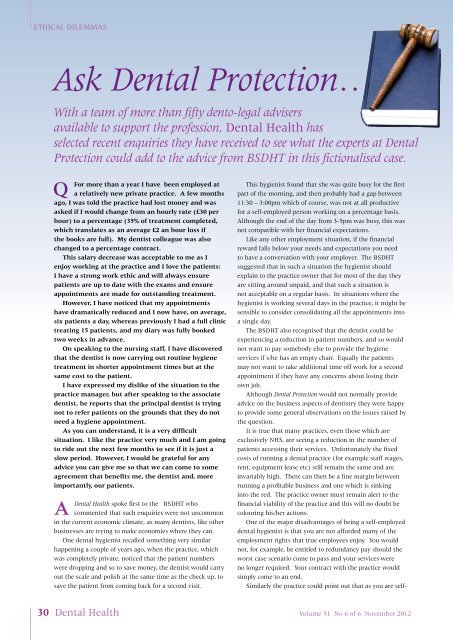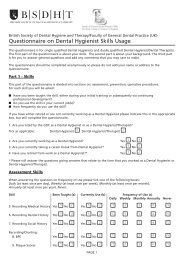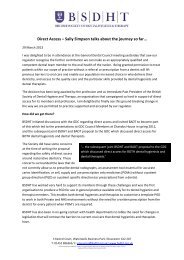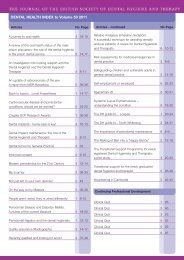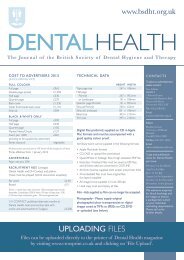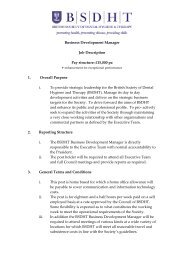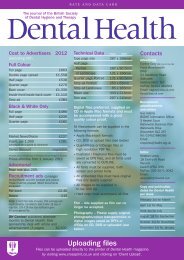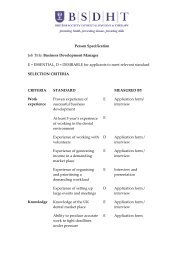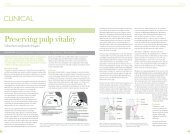Dental Health - British Society of Dental Hygiene & Therapy
Dental Health - British Society of Dental Hygiene & Therapy
Dental Health - British Society of Dental Hygiene & Therapy
- No tags were found...
Create successful ePaper yourself
Turn your PDF publications into a flip-book with our unique Google optimized e-Paper software.
ETHICAL DILEMMASAsk <strong>Dental</strong> Protection…With a team <strong>of</strong> more than fifty dento-legal advisersavailable to support the pr<strong>of</strong>ession, <strong>Dental</strong> <strong>Health</strong> hasselected recent enquiries they have received to see what the experts at <strong>Dental</strong>Protection could add to the advice from BSDHT in this fictionalised case.QFor more than a year I have been employed ata relatively new private practice. A few monthsago, I was told the practice had lost money and wasasked if I would change from an hourly rate (£30 perhour) to a percentage (35% <strong>of</strong> treatment completed,which translates as an average £2 an hour loss ifthe books are full). My dentist colleague was alsochanged to a percentage contract.This salary decrease was acceptable to me as Ienjoy working at the practice and I love the patients:I have a strong work ethic and will always ensurepatients are up to date with the exams and ensureappointments are made for outstanding treatment.However, I have noticed that my appointmentshave dramatically reduced and I now have, on average,six patients a day, whereas previously I had a full clinictreating 15 patients, and my diary was fully bookedtwo weeks in advance.On speaking to the nursing staff, I have discoveredthat the dentist is now carrying out routine hygienetreatment in shorter appointment times but at thesame cost to the patient.I have expressed my dislike <strong>of</strong> the situation to thepractice manager, but after speaking to the associatedentist, he reports that the principal dentist is tryingnot to refer patients on the grounds that they do notneed a hygiene appointment.As you can understand, it is a very difficultsituation. I like the practice very much and I am goingto ride out the next few months to see if it is just aslow period. However, I would be grateful for anyadvice you can give me so that we can come to someagreement that benefits me, the dentist and, moreimportantly, our patients.A<strong>Dental</strong> <strong>Health</strong> spoke first to the BSDHT whocommented that such enquiries were not uncommonin the current economic climate, as many dentists, like otherbusinesses are trying to make economies where they can.One dental hygienist recalled something very similarhappening a couple <strong>of</strong> years ago, when the practice, whichwas completely private, noticed that the patient numberswere dropping and so to save money, the dentist would carryout the scale and polish at the same time as the check up, tosave the patient from coming back for a second visit.This hygienist found that she was quite busy for the firstpart <strong>of</strong> the morning, and then probably had a gap between11:30 – 3:00pm which <strong>of</strong> course, was not at all productivefor a self-employed person working on a percentage basis.Although the end <strong>of</strong> the day from 3-5pm was busy, this wasnot compatible with her financial expectations.Like any other employment situation, if the financialreward falls below your needs and expectations you needto have a conversation with your employer. The BSDHTsuggested that in such a situation the hygienist shouldexplain to the practice owner that for most <strong>of</strong> the day theyare sitting around unpaid, and that such a situation isnot acceptable on a regular basis. In situations where thehygienist is working several days in the practice, it might besensible to consider consolidating all the appointments intoa single day.The BSDHT also recognised that the dentist could beexperiencing a reduction in patient numbers, and so wouldnot want to pay somebody else to provide the hygieneservices if s/he has an empty chair. Equally the patientsmay not want to take additional time <strong>of</strong>f work for a secondappointment if they have any concerns about losing theirown job.Although <strong>Dental</strong> Protection would not normally provideadvice on the business aspects <strong>of</strong> dentistry they were happyto provide some general observations on the issues raised bythe question.It is true that many practices, even those which areexclusively NHS, are seeing a reduction in the number <strong>of</strong>patients accessing their services. Unfortunately the fixedcosts <strong>of</strong> running a dental practice (for example staff wages,rent, equipment lease etc) still remain the same and areinvariably high. There can then be a fine margin betweenrunning a pr<strong>of</strong>itable business and one which is sinkinginto the red. The practice owner must remain alert to thefinancial viability <strong>of</strong> the practice and this will no doubt becolouring his/her actions.One <strong>of</strong> the major disadvantages <strong>of</strong> being a self-employeddental hygienist is that you are not afforded many <strong>of</strong> theemployment rights that true employees enjoy. You wouldnot, for example, be entitled to redundancy pay should theworst case scenario come to pass and your services wereno longer required. Your contract with the practice wouldsimply come to an end.Similarly the practice could point out that as you are self-30 <strong>Dental</strong> <strong>Health</strong> Volume 51 No 6 <strong>of</strong> 6 November 2012


